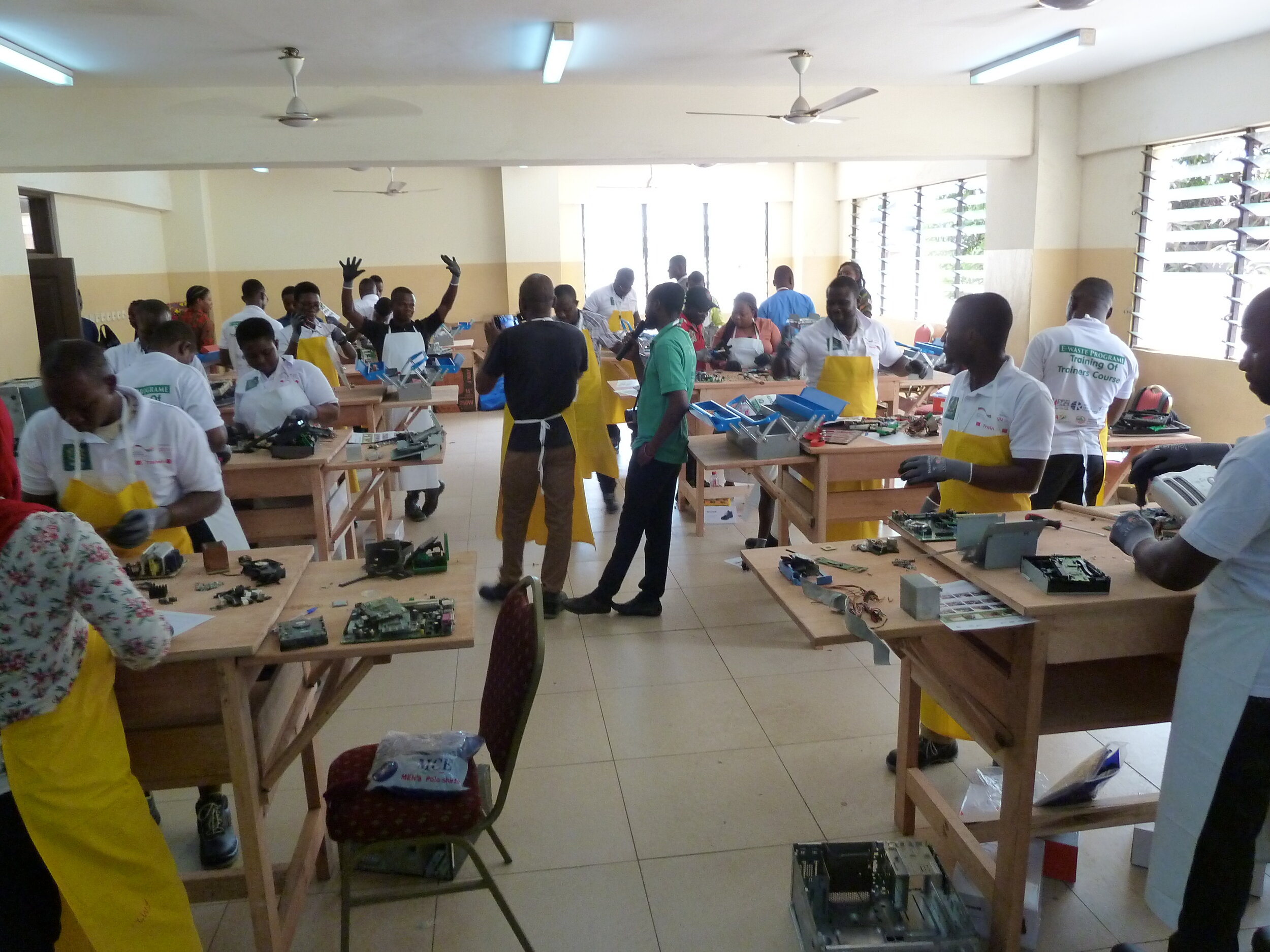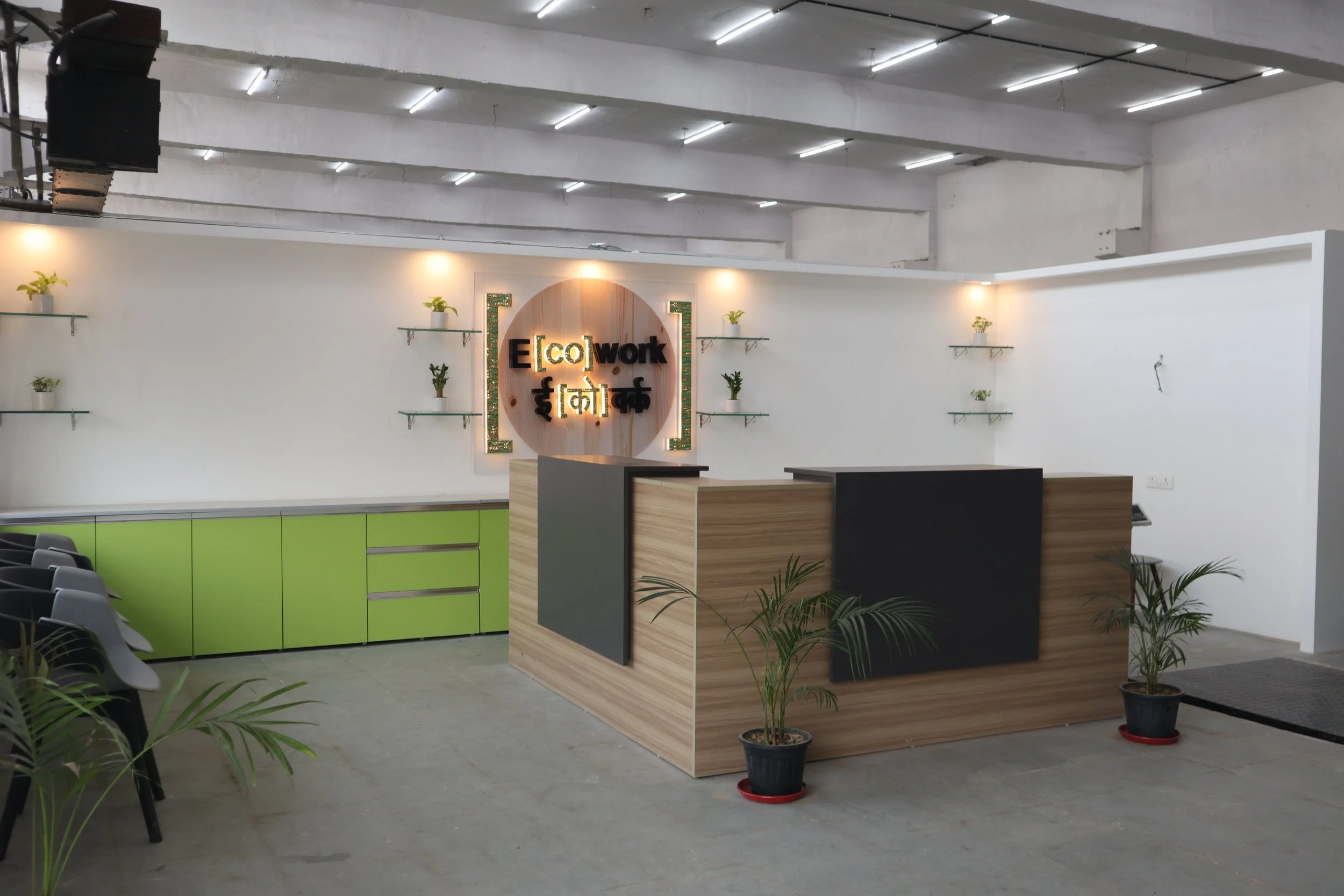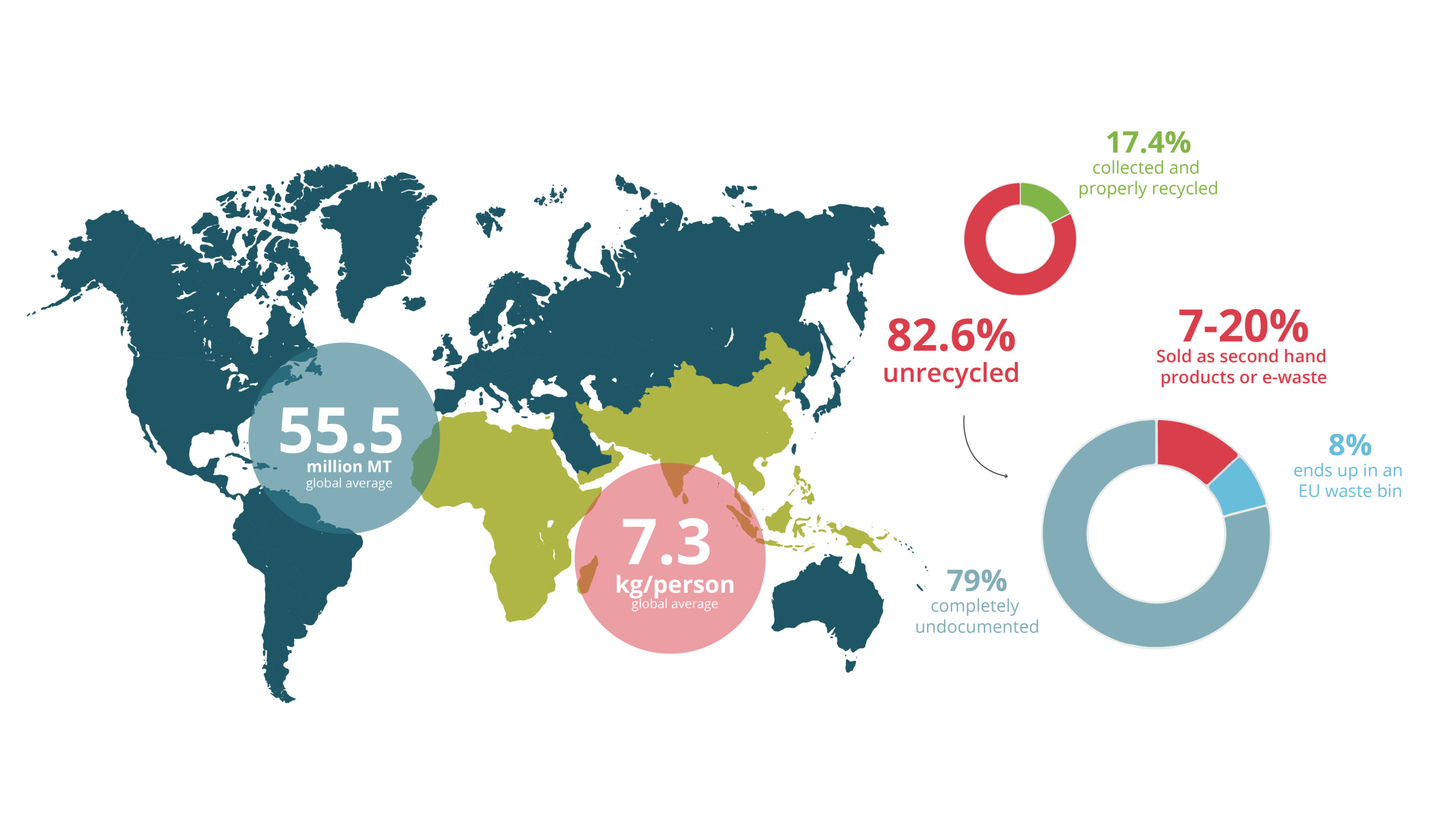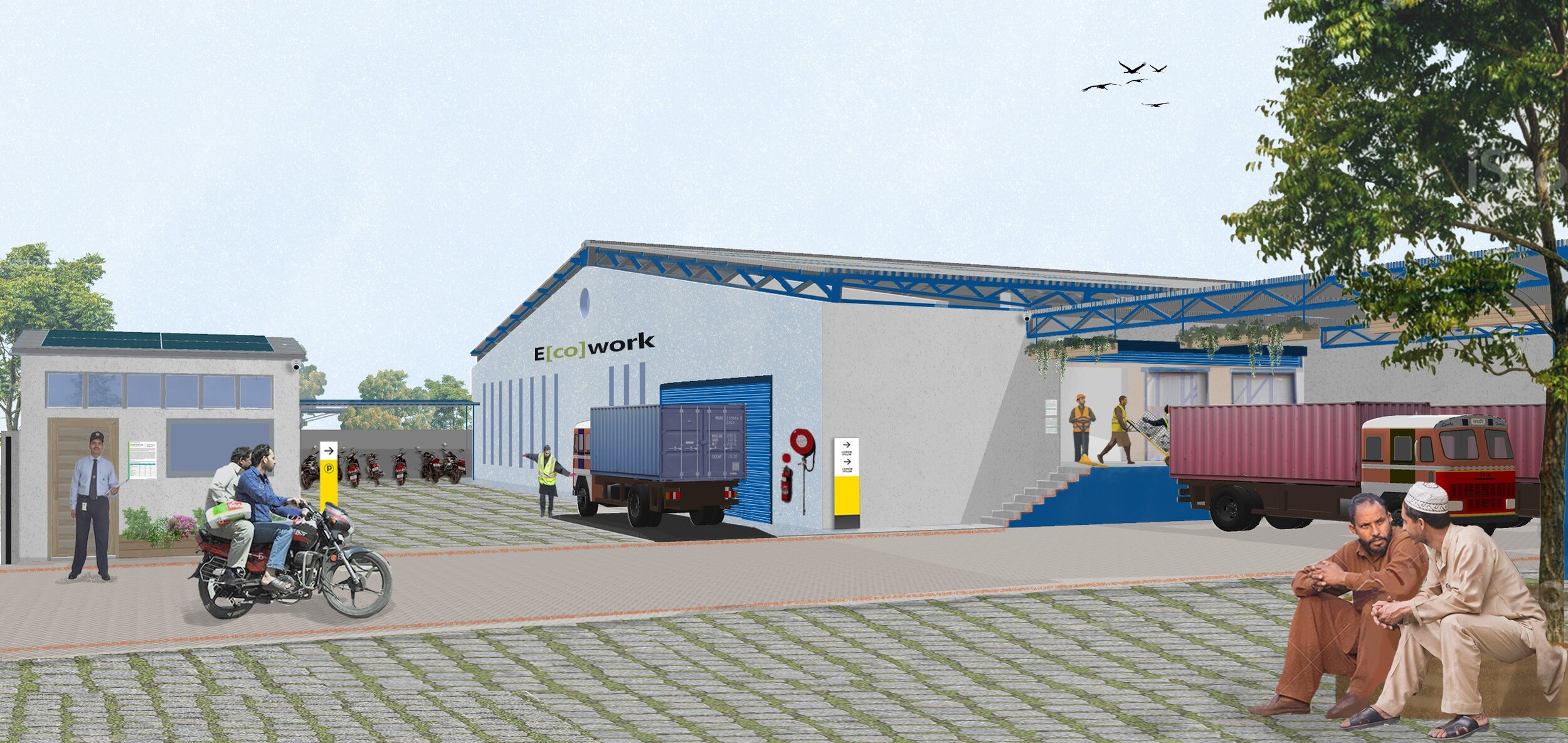
E[co]work empowers informal micro entrepreneurs through solutions for safe and inclusive electronic waste management
Get a glimpse of our facility
What happens to our electronics once we throw it away?
In 2020, the world generated approximately 55 million metric tons of electronic waste (e-waste). That’s more than 7 kg per person every year.
82.6% of our e-waste does not get formally recycled.
E-waste is processed outside of government oversight and legislation in the informal sector and is carried out in fatal and unsafe working conditions.
The hubs for informal e-waste processing are in the global south.
Countries like India are major hubs for informal recycling in the world. North East Delhi is the national e-waste recycling hub. 90% of the country’s e-waste is informally recycled here. While illegal shipments of e-waste from the global north to the global south is a concerning issue, India itself is also the world’s 3rd largest producer of e-waste. A majority of India’s e-waste is dismantled by skilled but informal labour in need for a livelihood migrating from rural areas around Delhi.

Safe and healthy e-waste recycling is the need of the hour
Closing materials cycles is crucial
Primary resource production has a huge impact on the environment and is a key driver for climate change. With the increasing demand for electronic products, reuse and recycling of materials is of utmost importance for environmental sustainability and material supply.
Health hazards and environmental pollution are wide-spread
E-waste is processed by the informal sector in residential neighborhoods. Dark and under-ventilated spaces and unsafe dismantling methods cause environmental pollution to air, soil and water. The pollution does not only affect workers, but whole neighborhoods. Young childern are particularly affected, as they play in contaminated areas.
Jobs and livelihoods depend on e-waste
The informal sector recovers valuable parts and precious metals from e-waste and returns them into the economy. This creates a crucial income for many people and whole families and is an relevant driver for economic development - particularly for disadvantaged groups that have few other opportunities.
Our solution: the E[co]work Space
The bridge between legal requirements, safe work practices and informal micro entrepreneurs.
The E[co]work Space is a physical facility for safe dismantling of e-waste and social inclusion. It is based on the concept of co-working spaces and the sharing economy and adapted to the e-waste dismantling sector and local context. At an E[co]work Space, micro-entrepreneurs can rent a work or storage space that is safe and in line with regulations while they remain responsible for their own business success. Trough training and the provision of fully compliant infrastructure, we remove important barriers that keep micro-entrepreneurs from growing, developing and professionalizing their business practices.
We aim for impact
E[co]work adds value to the economy and the state by increased compliance with taxes and regulations, to society through reduced health and environmental hazards and to the individuals in the informal sector, through avoided risk of business closure, optimization of business expenses through different renting options and improved market access.
Improved health
Improved health of workers, their families and neighbourhoods.
Access to health care.
Working place with health and safety guidelines.
Proper ventilation and lightning.
Protection equipment
Reduced pollution
Avoidance of pollution through state-of-the-art practices in dismantling and disposal
Correct storage of hazardous substances
Contribution to circular economy and sustainable resource management
Socio-economic benefits
Cleaner neighborhoods
Educational workshops/trainings
Support in business development
Optimization of business expenses
Improved market access
No threat of business closure
Meet Rashid and Haroon
E-waste micro entrepreneurs from Delhi
In Delhi, the dismantlers are mainly Muslim families from the nearby city of Meerut. In spite of facing health risks from the informal dismantling business, it has provided them with substantial socio-economic opportunities, which they couldn’t have gotten otherwise.
Haroon*
Profession: Trader of batteries, dismantler of plastics
Currently very conveniently placed within the market. If he moves, he is concerned that moving material across state lines will mean higher freight charges, tolls, paperwork as well as potential harassment by police. This is not a concern now as the main market for buying and selling is in Seelampur (Delhi).
*Name changed for protection
Rashid*
Profession: Small scale dismantler (flat panel Monitors)
As a small scale dismantler, easy access to the market is a priority. This convenient access will be a challenge in relocating to a new place. He thinks smaller dismantlers are at the risk of being exploited in terms of pricing by bigger traders who may have monopoly of supplying materials in the neighbourhood.
*Name changed for protection
Designed together with dismantlers
For maximum impact and a long-term viable business solution, we use a human centred, participatory approach. This inclusive process allows us to deep dive into the needs and the challenges that our end-users, the micro entrepreneurs, face. We are conceptualizing, co-creating and designing the E[co]work Space in consultation with them.

A donation as small as $50 contributes to a safe working space for informal micro entrepreneurs
We need the support of passionate donors and funding organizations to launch the first E[co]work facility in the world. Your donation will go directly towards our work in north-east Delhi and will be used for our work, including community outreach activities and protective equipment our beneficiaries
![E[co]work_02](http://images.squarespace-cdn.com/content/v1/60797b82221cdf4327e032a6/1619005044536-4D0CNP1OJZCFNUZU8QV7/E%5Bco%5Dwork+logo-03.png?format=1500w)
![E[co]work logo-03.png](https://images.squarespace-cdn.com/content/v1/60797b82221cdf4327e032a6/1618828689668-N8WZFFAN6DPI40IT4AL3/E%5Bco%5Dwork+logo-03.png)















